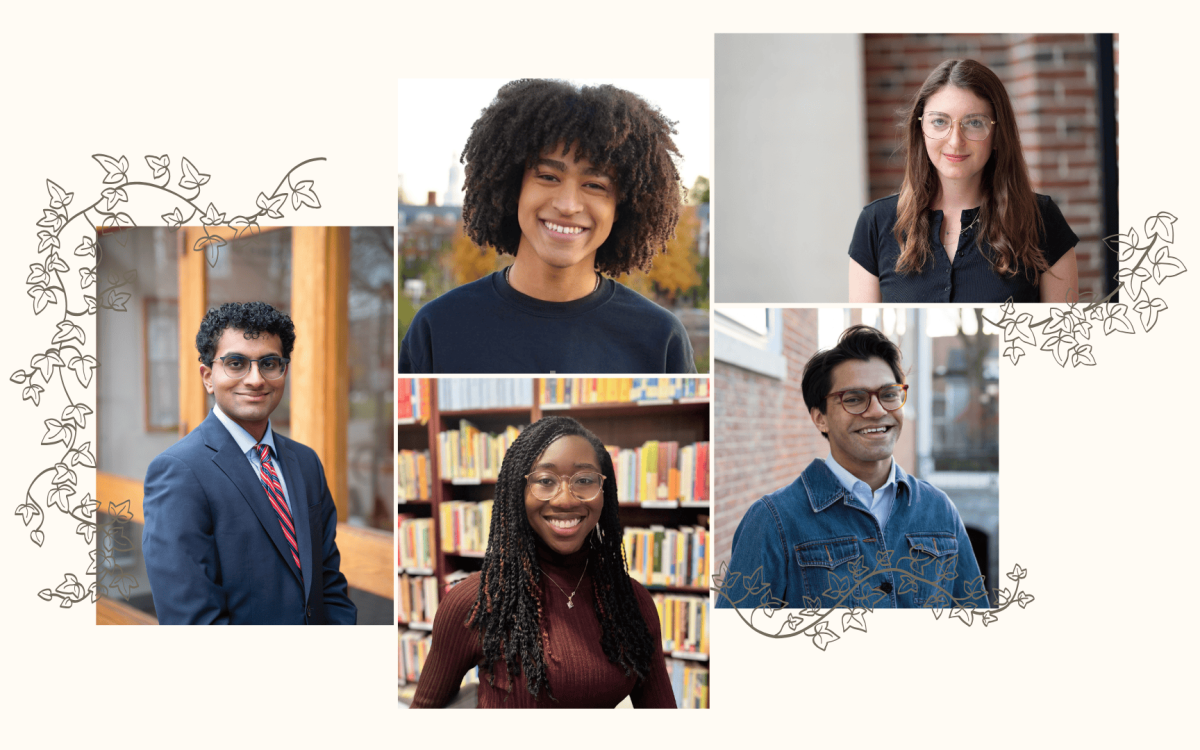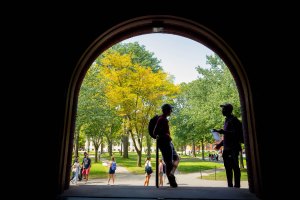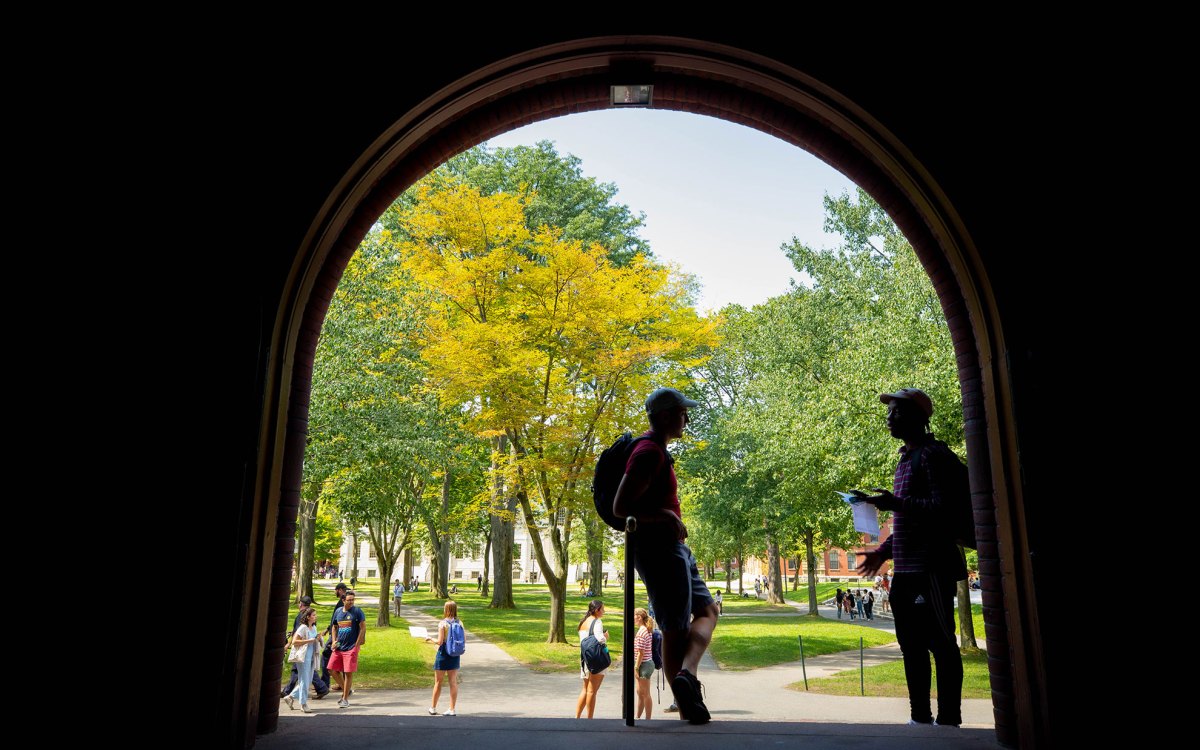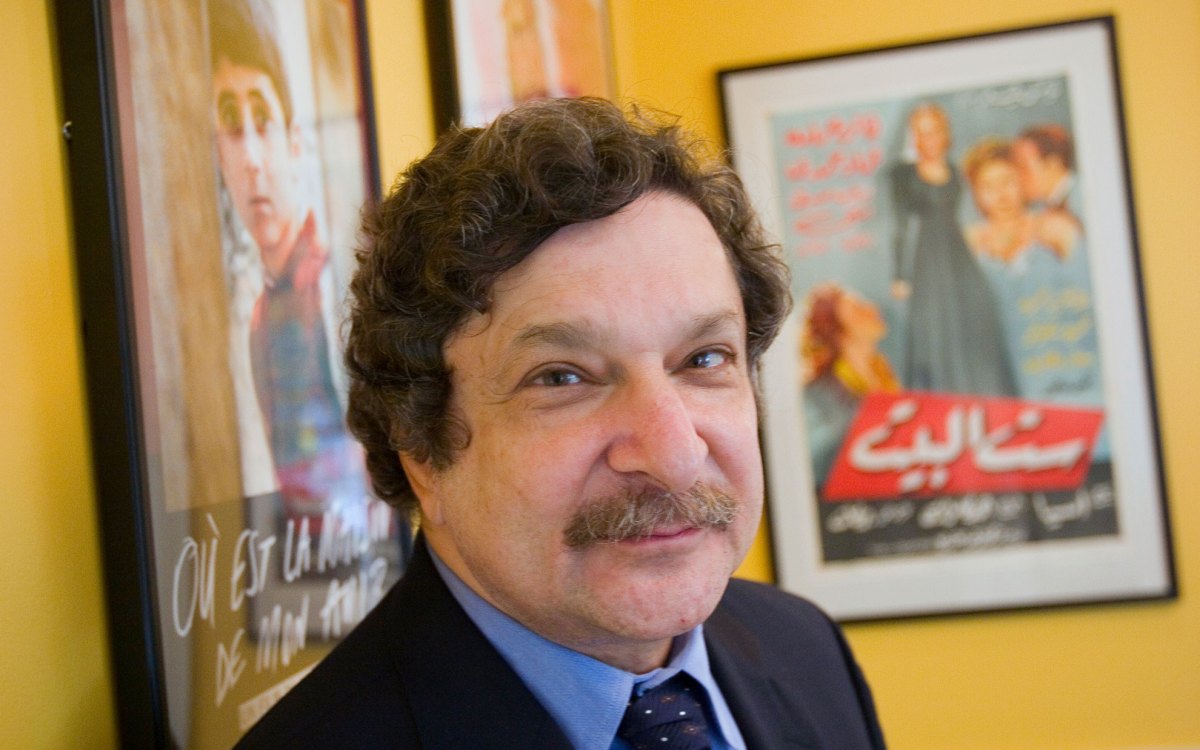
“The course has given me a chance to go beyond what I would normally experience in a classroom,” said William Weingarten ’11 of Peter Der Manuelian’s (pictured) Gen Ed course “Pyramid Schemes.” “I’ve enjoyed getting the chance to travel out to the Boston Museum of Fine Arts and to visit the Visualization Center here at Harvard to get a deeper intuition for what Egypt was really like thousands of years ago.”
Rose Lincoln/Harvard Staff Photographer
Generally, a happy anniversary
Gen Ed curriculum expands, draws wide interest after its first year
One year after the Class of 2013 became the first required to complete Harvard College’s Program in General Education, officials have one thing to say: so far, so good.
“Students seem excited by the new courses,” said Stephanie Kenen, associate dean of undergraduate education and administrative director of the program. “The flexibility of the program seems to be something they like.”
The General Education Program, known as Gen Ed, replaced the University’s 30-year-old Core Curriculum last fall. In the new program, students are required to take at least one course in each of eight areas of study: aesthetic and interpretive understanding; culture and belief; empirical and mathematical reasoning; ethical reasoning; science of living systems; science of the physical universe; societies of the world; and United States in the world. In addition, at least one of these courses must also engage substantially with the study of the past.
Kenen said it is far too early to assess the program’s success, but preliminary returns have been encouraging. For instance, even though upper-class students may still graduate under the requirements of the Core Curriculum, fully half of juniors and nearly 10 percent of seniors have switched to the new requirements. Moreover, when asked, “What was your most positive academic experience?” on last year’s freshman survey, many students identified Gen Ed classes.
Kenen said she and her colleagues have been surprised at the excitement over some courses. While “Science and Cooking” has received much press attention, other classes have seen enrollment spikes as well, such as “Pyramid Schemes,” a new course that explores the archaeological history of ancient Egypt.
“The course has given me a chance to go beyond what I would normally experience in a classroom,” said William Weingarten ’11. “I’ve enjoyed getting the chance to travel out to the Boston Museum of Fine Arts and to visit the Visualization Center here at Harvard to get a deeper intuition for what Egypt was really like thousands of years ago.”
Professor Peter Der Manuelian, who teaches “Pyramid Schemes,” said it is both challenging and rewarding to design a rigorous curriculum that is not too esoteric for the generalist.
“There is nothing like sharing the passion for one’s field with 170 interested undergraduates,” he said. “I enjoy watching students get excited about new pyramid construction theories, ancient religious schisms, explanations for the rise of complex society, and the mysteries of ancient Egyptian hieroglyphic grammar. Long ago I learned that to focus only on the narrow confines of one’s discipline can lead to diminished interest levels across the board.”
Weingarten said he has enjoyed all the Gen Ed courses he has taken so far. “Most Gen Ed professors put a lot of effort into ensuring that their courses are both fun and educational,” he said. “Gen Ed has given me more time to take courses that I enjoy outside of my normal concentration track, applied math.”
College officials say they are working to keep the Gen Ed curriculum fresh, pointing to the dramatic expansion of course offerings over the last year. When the program launched, 230 classes had been approved for Gen Ed; by this fall, that number had expanded to 356.
“We want a curriculum that evolves with our students, so we have to refresh and renew the curriculum on an ongoing basis,” said Kenen. “Some courses are constructed in such a way as to retain their suitability for the program without much change over time. Others may not have as long a shelf life.”
Looking to the future, the Faculty of Arts and Sciences created Graduate Seminars in General Education (GSGEs) as one way to meet the demand for new and engaging Gen Ed courses.
“Dean Allan Brandt [of the Graduate School of Arts and Sciences] came up with the idea,” Kenen explained. “Faculty take graduate students through the study of a topic at an advanced level and, at the same time, take these students through the process of designing an undergraduate course in that area. Graduate students get to work on course themes, design, and pedagogy, which is a really wonderful opportunity for them. If all goes well, the teaching fellows [TFs] for the new course will be the same people who helped design it. So, not only do we get a great new course, but we also get a group of well-trained and very engaged TFs.”
Kenen directs anyone curious about the program to the recently developed course trailers website. There they will find short videos for classes such as “Tangible Things,” “Primitive Navigation,” and “Fat Chance.”
“Each trailer is a snapshot of a course,” Kenen said. “Faculty members give a little introduction to the course, its aims, and how it meets the goals of Gen Ed. It’s a great way for parents, students, and others to find out about classes in the Gen Ed curriculum.”




